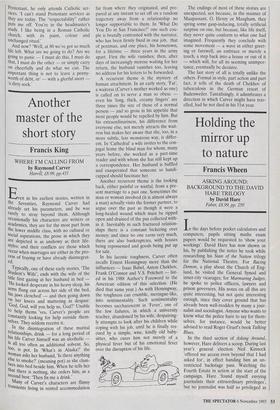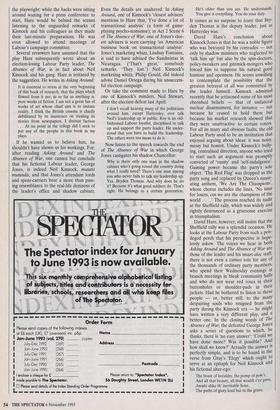Holding the mirror up to nature
Francis Wheen
ASKING AROUND: BACKGROUND TO THE DAVID HARE TRILOGY by David Hare Faber, £8.99, pp. 250 In the days before pocket calculators and computers, pupils sitting maths exam papers would be requested to 'show your workings'. David Hare has now shown us his, by publishing the notes he took while researching his State of the Nation trilogy for the National Theatre. For Racing Demon, a play about the Church of Eng- land, he visited the General Synod and inner-city vicarages; for Murmuring Judges, he spoke to police officers, lawyers and prison governors. His notes on all this are quite interesting, but not quite interesting enough, since they cover ground that has already been well-trodden by many a jour- nalist and sociologist. Anyone who wants to know what the police have to say for them- selves, for instance, would be better advised to read Roger Graefs book Talking Blues.
In the third section of Asking Around, however, Hare delivers a scoop. During last year's general election Neil Kinnock 'offered me access even beyond that I had asked for', in effect handing him an un- restricted backstage pass. Watching the Fourth Estate in action at the start of the campaign, Hare 'found myself envying journalists their extraordinary privileges', but no journalist was half so privileged as the playwright: while the hacks were sitting around waiting for a press conference to start, Hare would be behind the scenes listening to the unguarded remarks of Kinnock and his colleagues as they made their last-minute preparations. He was even allowed to attend meetings of Labour's campaign committee.
Several reviewers have assumed that the play Hare subsequently wrote about an election-losing Labour Party leader, The Absence of War, is in fact about Neil Kinnock and his gang. Hare is irritated by the suggestion. He writes in Asking Around: It is essential to stress at the very beginning of this book of research, that the plays which flowed from it are, in so far as anything is, pure works of fiction. I am not a great fan of works of art whose chief aim is to imitate reality. I think the British cinema is chiefly debilitated by its insistence on stealing its stories from newspapers. I distrust faction . At no point in the trilogy did I seek to put any of the people in this book in my plays.
If he wanted us to believe him, he shouldn't have shown us his workings. For, after reading Asking Around and The Absence of War, one cannot but conclude that his fictional Labour leader, George Jones, is indeed Neil Kinnock, mutatis mutandis, and that Jones's attendant lords and spear-carriers bear a more than pass- ing resemblance to the real-life denizens of the leader's office and shadow cabinet. Even the details are unaltered. In Asking Around, one of Kinnock's 'closest advisers' mentions to Hare that, 'I've done a lot of transactional analysis' (a form of game- playing psycho-nonsense); in Act 2 Scene 6 of The Absence of War, one of Jones's clos- est advisers is seen carrying 'an American business book on transactional analysis'. Jones's marketing whizz, Lindsay Fontaine, is said to have advised the Sandinistas in Nicaragua. (That's great,' somebody remarks. 'They lost.') Neil Kinnock's marketing whizz, Philip Gould, did indeed advise Daniel Ortega during his unsuccess- ful election campaign.
Or take the comment made to Hare by one of Kinnock's minders, Neil Stewart, after the election defeat last April: I don't recall hearing many of the politicians around him, except Hattersley, ever talk Neil's leadership up in public. Roy is an old- fashioned Labour loyalist, disciplined to talk up and support the party leader. He under- stood that you have to build the leadership. The others were too mean to do it.
Now listen to the speech towards the end of The Absence of War in which George Jones castigates his shadow Chancellor: Why is there only one man in the shadow cabinet who's going round the country doing what I really need? There's one man among you who never fails to talk my leadership up. Yes, Bryden Thomas. And why does he do it? Because it's what good soldiers do. That's right. He belongs to a certain generation.
He's older than you are. He understands. You give it everything. You do your duty.
It comes as no surprise to learn that Bry- den Thomas is the deputy leader, just as Hattersley was. David Hare's conclusion about Kinnock/Jones is that he was a noble figure who was betrayed by his comrades — not only by shadow ministers who neglected to 'talk him up' but also by the spin-doctors, policy-tweakers and gimmick-mongers who forced him to suppress his natural good humour and openness. He seems unwilling to contemplate the possibility that the greatest betrayal of all was committed by the leader himself. Kinnock admitted recently that he jettisoned some of his most cherished beliefs — that of unilateral nuclear disarmament, for instance — not because he ceased to hold them but because his market research showed that they were unattractive to certain voters, For all its many and obvious faults, the old Labour Party used to be an institution that enjoyed arguing about ideas: it was noisy, messy but honest. Under Kinnock's bully- ing, centralised direction, anyone who tried to start such an argument was promptly convicted of 'vanity' and 'self-indulgence'. Gaining power became the party's sole object. The Red Flag' was dropped as the party song and replaced by Queen's nause- ating anthem, 'We Are The Champions', whose chorus includes the lines, 'No time for losers, cos we are the champions of the world . .' The process reached its nadir at the Sheffield rally, which was widely and rightly denounced as a gruesome exercise in triumphalism. David Hare, however, still insists that the Sheffield rally was a splendid occasion. He looks at the Labour Party from such a priv- ileged perch that his perspective is hope- lessly askew. The voices we hear in both Asking Around and The Absence of War are those of the leader and his smart-alec staff; there is not even a cameo role for any of the thousands of ordinary party members, who spend their Wednesday evenings at branch meetings in bleak community halls and who do not wear red roses in their buttonholes or shoulder-pads in their jackets. Had he bothered to listen to these people — or, better still, to the many despairing souls who resigned from the party during the Kinnock era — he might have written a very different play, and a better one. In the closing words of The Absence of War, the defeated George Jones asks a series of questions to which, he thinks, there is 'no easy answer': 'Could we have done more? Was it possible? And how shall we know?' Actually the answer is perfectly simple, and is to be found in the verse from Gray's 'Elegy' which ought to serve as an epitaph for Neil Kinnock and his fictional alter-ego:
The boast of heraldry, the pomp of poWY, And all that beauty, all that wealth e'er gave, Awaits alike th' inevitable hour, The paths of glory lead but to the grave.











































































 Previous page
Previous page